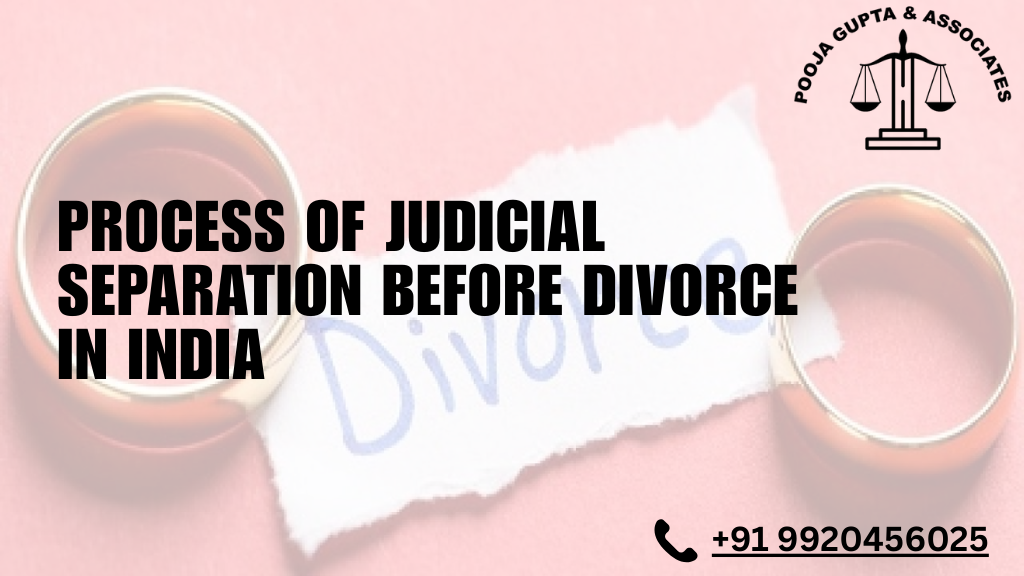Judicial separation serves as a legal mechanism under Indian law that allows married couples to live apart without dissolving their marriage. This provision provides individuals with an opportunity to reflect on their relationship before opting for a divorce. This article delves into the process of judicial separation before divorce in India, outlining the legal framework, grounds, procedure, and implications.
1. Understanding Judicial Separation
Judicial separation is a court-mandated decree that enables married couples to cease cohabitation while preserving their marital status. Unlike divorce, which terminates the marriage, judicial separation suspends the couple’s marital duties and obligations, granting them time and space to reassess their relationship. Importantly, judicial separation does not dissolve the marriage, meaning that neither spouse can remarry unless they obtain a divorce later.
2. Legal Provisions Governing Judicial Separation
In India, judicial separation is governed by various personal laws applicable to different communities:
- Hindu Marriage Act, 1955: Section 10 provides for judicial separation for Hindus.
- Special Marriage Act, 1954: Section 22 allows for judicial separation for couples married under this Act.
- Parsi Marriage and Divorce Act, 1936: Section 22A provides for judicial separation for Parsis.
- Indian Divorce Act, 1869: Section 22 allows for judicial separation for Christians.
These provisions outline the grounds on which judicial separation can be sought and the procedure to be followed.
3. Grounds for Judicial Separation
Under Section 10 of the Hindu Marriage Act, 1955, either spouse can seek judicial separation on the following grounds:
- Adultery: If a spouse has voluntarily had sexual intercourse with someone other than their partner.
- Cruelty: If a spouse treats the other with cruelty, either physical or mental.
- Desertion: If a spouse has deserted the other for a continuous period of not less than two years.
- Conversion: If a spouse has converted to another religion.
- Unsound Mind: If a spouse is suffering from a mental disorder that makes it impossible to live together.
- Leprosy: If a spouse is suffering from leprosy.
- Venereal Disease: If a spouse is suffering from a communicable venereal disease.
- Renunciation: If a spouse has renounced the world by entering a religious order.
- Not Heard Alive: If a spouse has not been heard alive for a period of seven years or more.
These grounds are similar to those for divorce under Section 13 of the Hindu Marriage Act, 1955.
4. Procedure for Filing Judicial Separation
The process of obtaining judicial separation involves several steps:
a. Consultation with a Family Lawyer
The first step is to consult an experienced family law attorney to evaluate the case. The lawyer will assess if the situation meets any legal grounds for judicial separation and advise whether this route is suitable for the individual.
b. Drafting the Petition
Once the decision is made to proceed, the lawyer will prepare a petition for judicial separation. This legal document will outline details of the marriage (date, place, registration, etc.), information about both spouses, and clearly state the grounds on which judicial separation is being sought. It will include facts and instances supporting those grounds, such as incidents of cruelty or evidence of adultery.
c. Filing the Petition
The petition is filed in the appropriate family court. The court will issue a notice to the respondent (the other spouse), who will be required to appear before the court.
d. Court Proceedings
During the court proceedings, both parties will present their evidence and arguments. The court may also refer the matter to mediation or counseling to explore the possibility of reconciliation.
e. Judgment
If the court is satisfied with the grounds presented, it will grant a decree of judicial separation. This decree suspends the marital obligations and allows the couple to live apart.
5. Implications of Judicial Separation
While judicial separation does not dissolve the marriage, it has several legal implications:
- Cohabitation: The couple is no longer required to live together.
- Maintenance: The spouse seeking separation may be entitled to maintenance.
- Custody of Children: The court may decide on the custody and welfare of children.
- Property Rights: The rights to property may be affected, depending on the court’s order.
It’s important to note that judicial separation does not automatically lead to divorce. However, after a period of one year from the decree of judicial separation, either spouse can file for divorce on the ground of irretrievable breakdown of marriage.
6. Judicial Separation vs. Divorce
While both judicial separation and divorce allow couples to live apart, they differ in several aspects:
- Status of Marriage: In judicial separation, the marriage remains intact, whereas in divorce, the marriage is legally dissolved.
- Remarriage: Neither spouse can remarry during the period of judicial separation. However, after divorce, both parties are free to remarry.
- Legal Proceedings: The grounds for judicial separation are similar to those for divorce, but the procedure for obtaining judicial separation is generally less complex.
Choosing between judicial separation and divorce depends on the specific circumstances and the desired outcome. Consulting with a legal professional can provide guidance tailored to the individual’s situation.
7. Recent Legal Developments
In recent years, Indian courts have emphasized the importance of preserving the sanctity of marriage while also recognizing the need for individual rights and personal dignity. For instance, the Delhi High Court ruled that an employed wife is entitled to maintenance based on the standard of living during marriage, even if she is financially independent.
Such rulings underscore the evolving approach of the judiciary towards marital disputes, balancing traditional values with contemporary realities.
8. Conclusion
Judicial separation provides a legal avenue for couples to live apart without dissolving their marriage, offering a period of reflection and potential reconciliation. Understanding the legal framework, grounds, procedure, and implications of judicial separation is crucial for individuals considering this option. Consulting with an experienced family law attorney can provide valuable insights and assistance in navigating this process.
For those seeking trusted divorce lawyers in Mumbai or an experienced divorce advocate in India, Advocatepooja offers compassionate yet strategic representation. Whether you need the best divorce lawyer in Navi Mumbai or reliable divorce lawyers in Navi Mumbai, we provide expert legal support to help you move forward with confidence.



